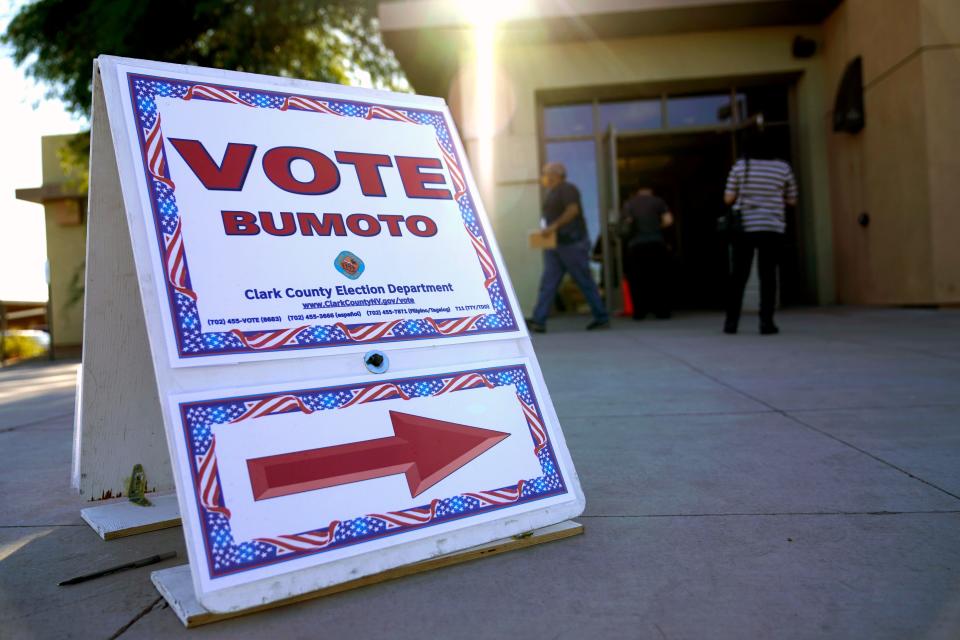Electronic voting machines can be used in AZ, concurrent resolution is not binding | Fact check
- Oops!Something went wrong.Please try again later.
The claim: Arizona state legislature banned electronic voting machines for all future federal elections
A May 24 Facebook post (direct link, archive link) claimed a key battleground state is making a major change to its election protocol.
“The Arizona state legislature banned electronic voting machines for all future federal elections,” reads the post.
It was shared nearly 900 times in less than a week. A similar version of the claim was shared more than 850 times.
Follow us on Facebook! Like our page to get updates throughout the day on our latest debunks
Our rating: False
The state’s legislature passed a "concurrent resolution" in March that seeks to ban electronic voting systems unless they meet certain criteria, but the resolution wasn't signed by the governor and does not have the force of law. Arizona state law still allows electronic voting systems to be used in elections, and changing that would require the legislature to pass a bill and the governor to sign it into law, experts say. There's no precedent allowing the legislature to unilaterally ban electronic voting in this manner.
Arizona law allows for electronic voting systems, concurrent resolution doesn't change that
The post in question is from Convention of States, a Facebook page and website with a history of publishing misleading posts. USA TODAY has previously noted the missing context for its claims that President Joe Biden’s Build Back Better Act cost $5 trillion and that the Biden administration spends Americans’ tax dollars to give smartphones to undocumented immigrants.
The recent claim also oversimplifies an issue that is far from settled.
The Arizona Senate Majority Leader, Republican Sonny Borrelli, sent a letter to the state’s 15 counties in May that caused confusion over the state’s election law, as reported by Votebeat. In the letter obtained by the outlet, Borrelli referenced Senate Concurrent Resolution 1037 and said “no electronic voting systems in the state of Arizona may be used as the primary method” for federal elections unless it meets specific requirements.
Fact check: False claim that Kari Lake's lawsuit shows Arizona used 'no signature verification'
Those conditions were outlined in the concurrent resolution that was passed by the state House and Senate in March, which included requirements that all of the voting system's components be made in the U.S. and that the source code used in any computerized voting machine be made available to the public.
But the resolution doesn’t change Arizona’s existing election law, as Arizona Secretary of State Adrian Fontes noted in a May 22 news release.
Arizona state law allows electronic voting systems to be used in federal and other elections. Changing that policy would require a new law be passed by the legislature and signed by the governor, Fontes said.
Stefanie Lindquist, a professor of law and political science at Arizona State University, said concurrent resolutions "express the will" of the two chambers but are not presented to the state's executive branch for approval or veto, so they do not have the ability to overturn existing law.
Borrelli, however, writes in his letter that language in Article I, Section 4, Clause 1 of the U.S. Constitution gives state legislatures authority over conducting federal elections. This is what's known as independent state legislature theory. Lindquist said such an interpretation and usage is "novel" and "untested."
Though concurrent resolutions do not have the force of law, Lindquist said it remains to be seen whether Arizona's 15 counties will concur with Borrelli's interpretation of the Constitution or if the matter will be settled in courts.

USA TODAY has debunked numerous claims about Arizona elections, including that nearly 250,000 voting attempts failed in the Arizona midterm election in 2022 and that an Arizona judge was forced to throw out 274,000 ballots and overturn the election.
USA TODAY reached out to the user who shared the post for comment but did not immediately receive a response.
Our fact-check sources:
Stefanie Lindquist, May 31, Phone call with USA TODAY
Arizona Legislature, accessed May 30, ARS 16-443
U.S. Senate, accessed May 30, Types of Legislation
Votebeat, May 23, Arizona isn’t banning machines to count ballots. Why a top senator’s declaration means nothing.
Arizona Secretary of State, May 22, Statement from Secretary Fontes on Senate Concurrent Resolution 1037
Arizona Senate, April 3, Senate Concurrent Resolution 1037
Brennan Center for Justice, June 6, 2022, The ‘Independent State Legislature Theory,’ Explained
Thank you for supporting our journalism. You can subscribe to our print edition, ad-free app or e-newspaper here.
Our fact-check work is supported in part by a grant from Facebook.
This article originally appeared on USA TODAY: Electronic voting machines still legal in AZ elections | Fact check

